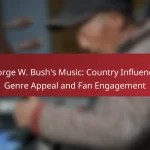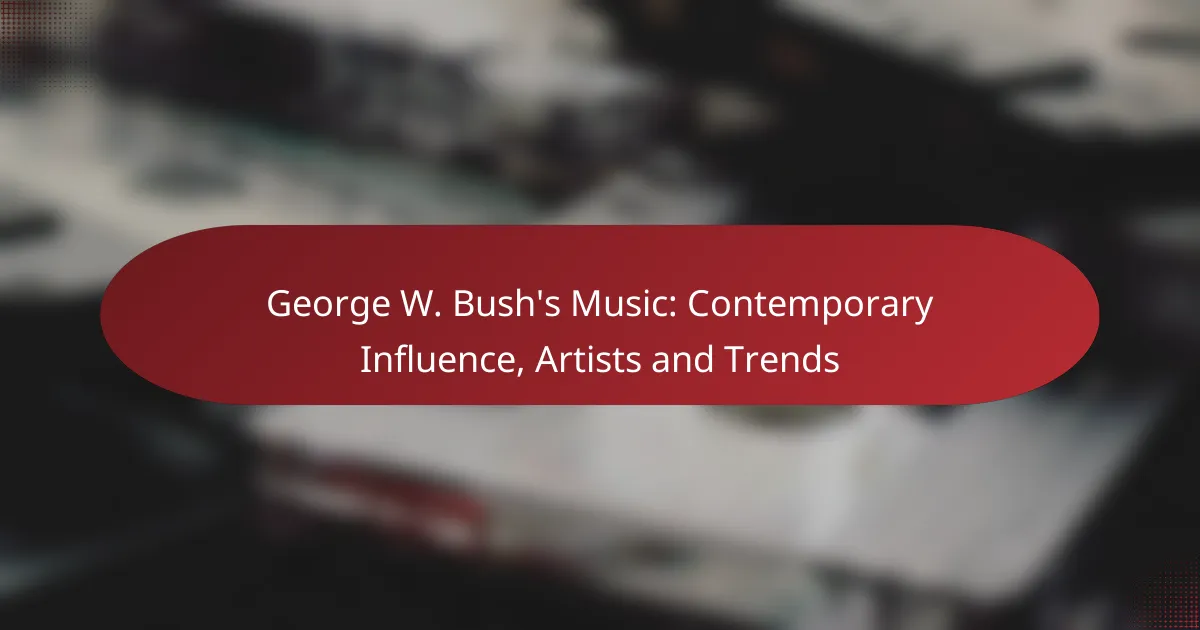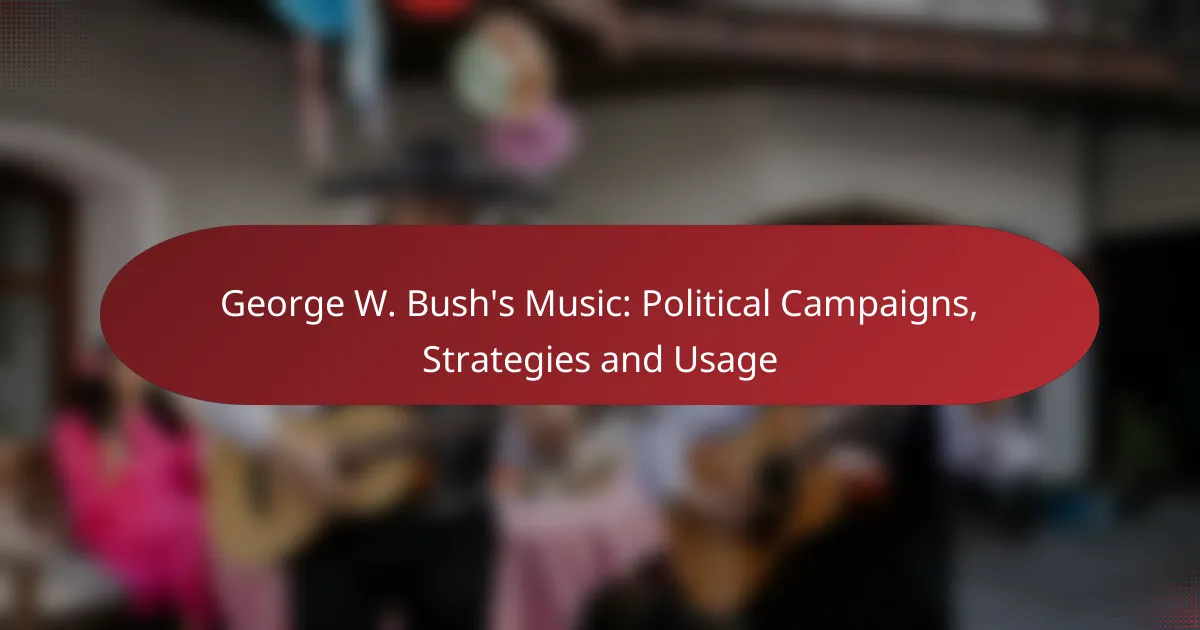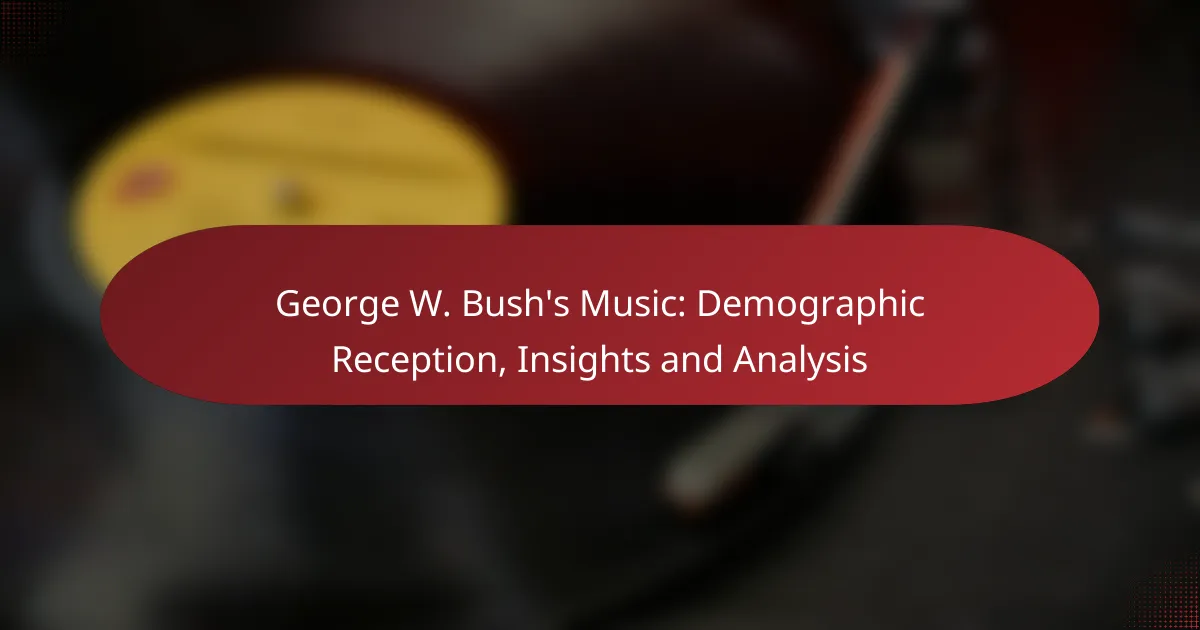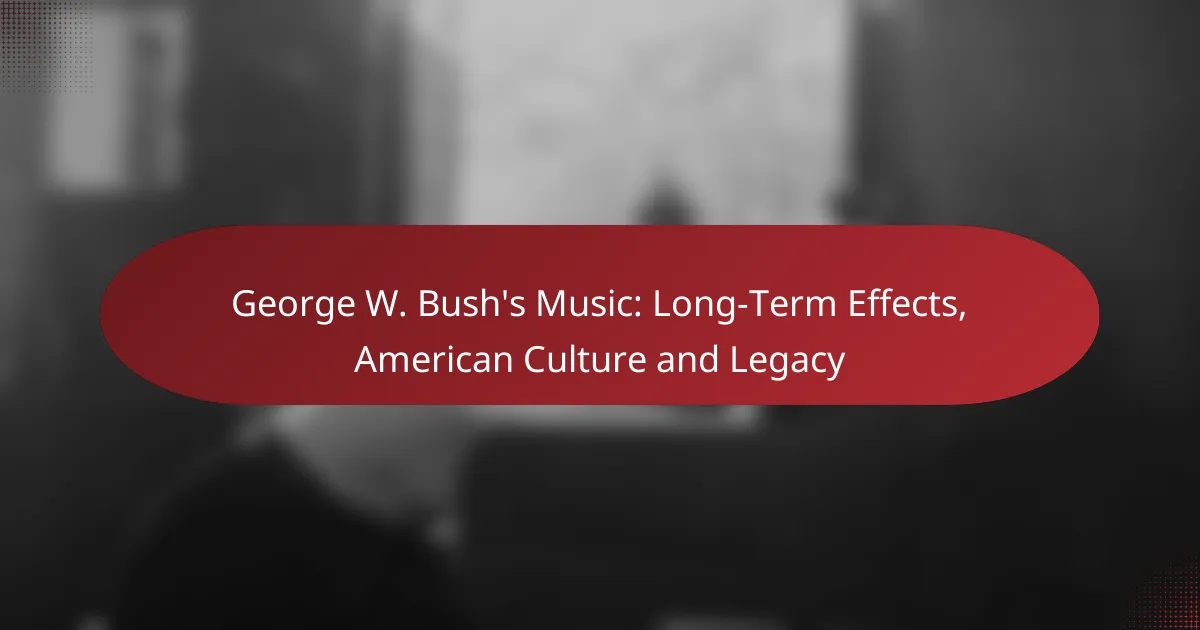George W. Bush’s presidency left a lasting mark on contemporary music, particularly through the rise of politically charged themes and collaborations with diverse artists. His administration’s significant events, such as the Iraq War, sparked a wave of musical responses that influenced various genres, including country, Americana, and hip-hop. Today, current trends in music continue to reflect this legacy, emphasizing political commentary and the resurgence of protest songs, alongside the strategic use of social media by artists to engage with pressing societal issues.
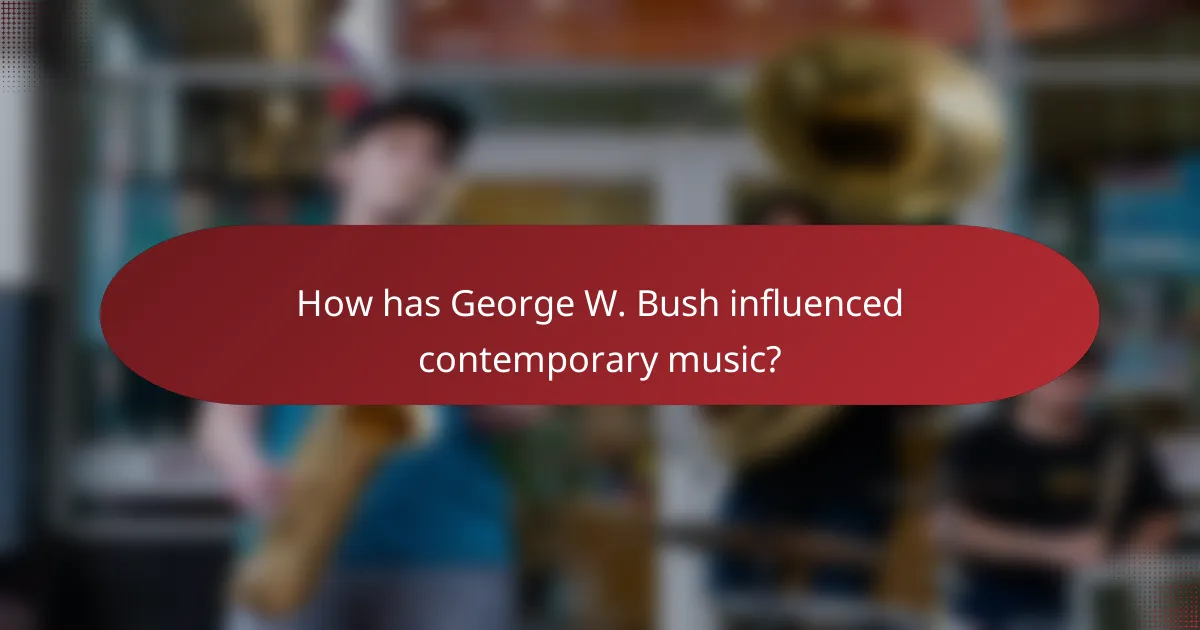
How has George W. Bush influenced contemporary music?
George W. Bush’s presidency significantly impacted contemporary music, particularly through the emergence of politically charged themes and collaborations with various artists. His administration’s policies and events, such as the Iraq War, inspired a wave of musical responses that shaped the landscape of modern genres.
Political themes in modern songs
Many contemporary songs reflect the political climate during George W. Bush’s presidency, addressing issues like war, civil rights, and government accountability. Artists across genres, from rock to hip-hop, used their platforms to critique policies and express dissent, leading to a surge in politically motivated music. Notable examples include tracks that directly reference the Iraq War or the aftermath of 9/11.
These political themes often resonate with listeners who seek music that reflects their own views and experiences. The blending of personal and political narratives has become a hallmark of modern songwriting, encouraging artists to engage with current events in meaningful ways.
Collaborations with artists
During and after Bush’s presidency, numerous artists collaborated to create music that addressed political themes and social issues. High-profile collaborations, such as those between rock bands and hip-hop artists, showcased a united front against perceived injustices. These partnerships often resulted in powerful anthems that gained traction in both mainstream and underground scenes.
Collaborative efforts also extended to benefit concerts and projects aimed at raising awareness for various causes. Such initiatives highlighted the role of music as a tool for activism, further solidifying the connection between artists and political movements during this era.
Impact on country music
George W. Bush’s presidency had a notable influence on country music, with many artists expressing their support or opposition to his policies. This period saw a rise in songs that reflected the sentiments of rural America, often intertwining patriotism with critiques of government actions. Artists like Toby Keith became emblematic of this trend, using their music to rally support for the military and express national pride.
Conversely, other country musicians took a stand against the administration, leading to a divide within the genre. This dynamic created a rich tapestry of narratives that continue to shape country music’s evolution and its relationship with politics.
Influence on pop culture
George W. Bush’s presidency permeated pop culture, influencing not just music but also television, film, and literature. Artists often used satire and parody to comment on his administration, leading to a cultural landscape rich with critique and humor. This interplay between politics and pop culture allowed musicians to reach broader audiences while addressing serious issues.
Television shows and films frequently referenced Bush and his policies, further embedding his influence in the cultural consciousness. This cross-pollination between music and other forms of entertainment helped to amplify messages and foster discussions about political and social issues.
Legacy in music festivals
The legacy of George W. Bush’s presidency is evident in music festivals that emerged or gained prominence during his time in office. Events like Coachella and Lollapalooza became platforms for artists to voice their political opinions and connect with audiences who shared similar sentiments. These festivals often featured lineups that included politically charged performances, reinforcing the connection between music and activism.
Moreover, festivals have increasingly incorporated themes of social justice and political awareness, reflecting the ongoing influence of Bush’s era on the music community. This trend underscores the role of music festivals as spaces for dialogue and expression, where artists and fans alike can engage with pressing issues.
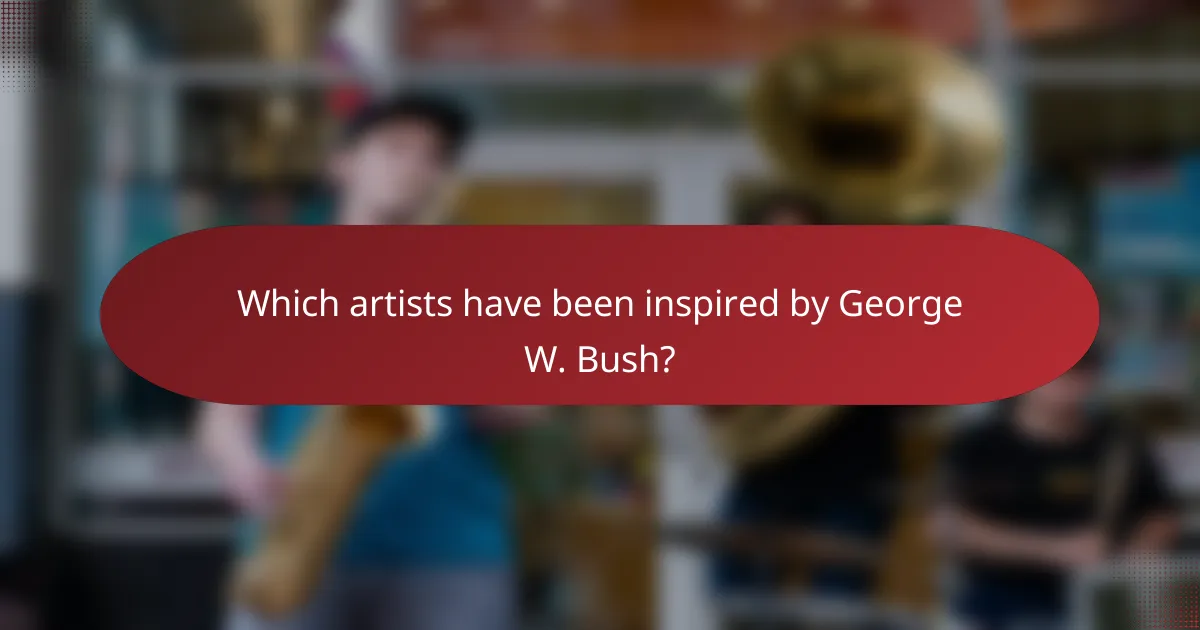
Which artists have been inspired by George W. Bush?
Numerous artists have drawn inspiration from George W. Bush’s presidency, reflecting the political climate and social issues of the time. This influence spans various genres, with notable examples emerging in country, Americana, and hip-hop music.
Artists like Toby Keith
Toby Keith is one of the most prominent artists inspired by George W. Bush, particularly through his patriotic anthems. His song “Courtesy of the Red, White and Blue (The Angry American)” became a rallying cry for many Americans post-9/11, showcasing a strong sense of nationalism that resonated with Bush’s policies. Keith’s music often reflects themes of military support and American pride, aligning closely with the sentiments of Bush’s administration.
Musicians from the Americana genre
The Americana genre has seen a variety of artists influenced by the socio-political landscape during Bush’s presidency. Musicians like Steve Earle and Wilco have critiqued government policies and social issues through their lyrics, often addressing topics such as war and civil liberties. Their work serves as a counter-narrative to the mainstream patriotic sentiments, providing a platform for dissent and reflection on the era’s complexities.
Influence on hip-hop artists
Hip-hop artists have also responded to George W. Bush’s presidency, often using their music to critique his policies and the broader political climate. Artists like Kanye West and Common have addressed issues such as social justice, inequality, and the impact of war in their lyrics. This genre’s response has been characterized by a blend of protest and personal storytelling, making it a powerful medium for expressing dissent against the backdrop of Bush’s time in office.
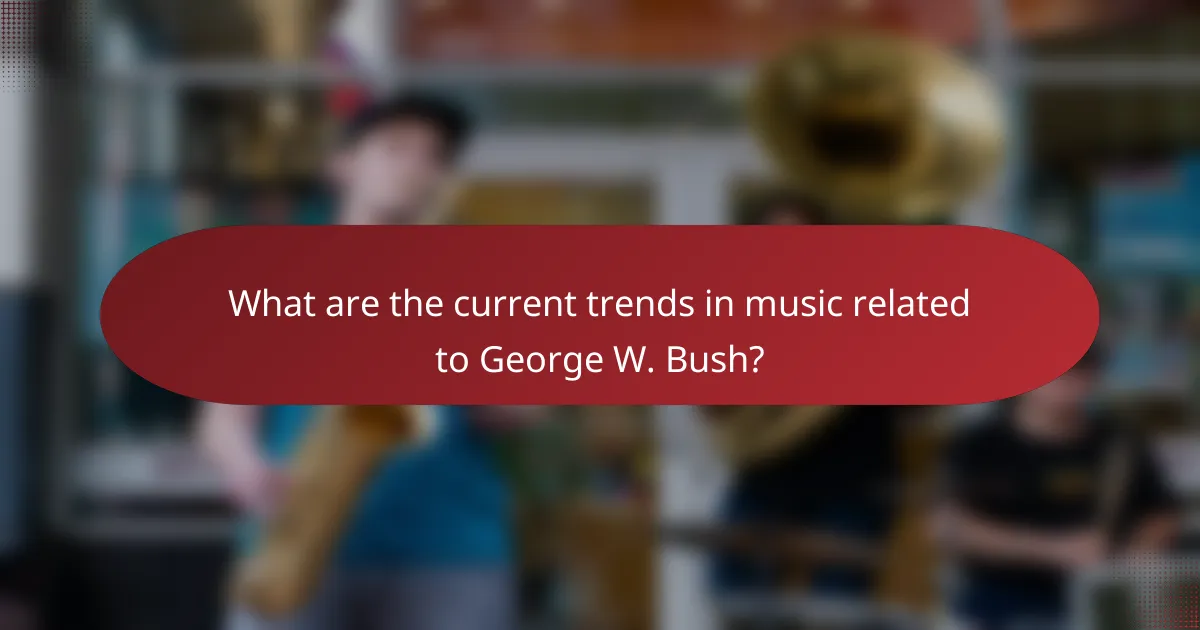
What are the current trends in music related to George W. Bush?
Current trends in music related to George W. Bush focus on political commentary, the resurgence of protest songs, and the strategic use of social media by artists. These elements reflect a growing engagement with political themes and societal issues in contemporary music.
Political commentary in lyrics
Many contemporary artists incorporate political commentary in their lyrics, often addressing the policies and actions of the Bush administration. This trend can be seen across various genres, from hip-hop to rock, where musicians express their views on war, social justice, and civil liberties. Lyrics often serve as a vehicle for critique, resonating with listeners who seek to understand the political landscape.
For example, songs that reference the Iraq War or domestic policies highlight the impact of Bush’s presidency on everyday life. Artists like Green Day and Eminem have used their platforms to challenge the status quo, making political statements that encourage public discourse.
Rise of protest songs
The rise of protest songs in recent years reflects a renewed interest in activism within the music industry. Inspired by historical movements, contemporary musicians are crafting songs that rally listeners against perceived injustices. This resurgence is often linked to the political climate during and after Bush’s presidency, where many felt compelled to voice their dissent through music.
Notable examples include tracks that address issues such as climate change, racial inequality, and government accountability. These songs not only entertain but also mobilize audiences, urging them to take action and engage in political processes.
Use of social media by artists
Social media has become a powerful tool for artists to share their political messages and connect with audiences. Platforms like Twitter, Instagram, and TikTok allow musicians to disseminate their views quickly and engage in real-time conversations about current events. This direct communication fosters a sense of community among fans who share similar beliefs.
Artists often use social media to promote their protest songs, share behind-the-scenes content, and encourage activism. This trend highlights the importance of digital platforms in shaping public opinion and mobilizing grassroots movements, particularly in the context of political commentary related to George W. Bush’s legacy.
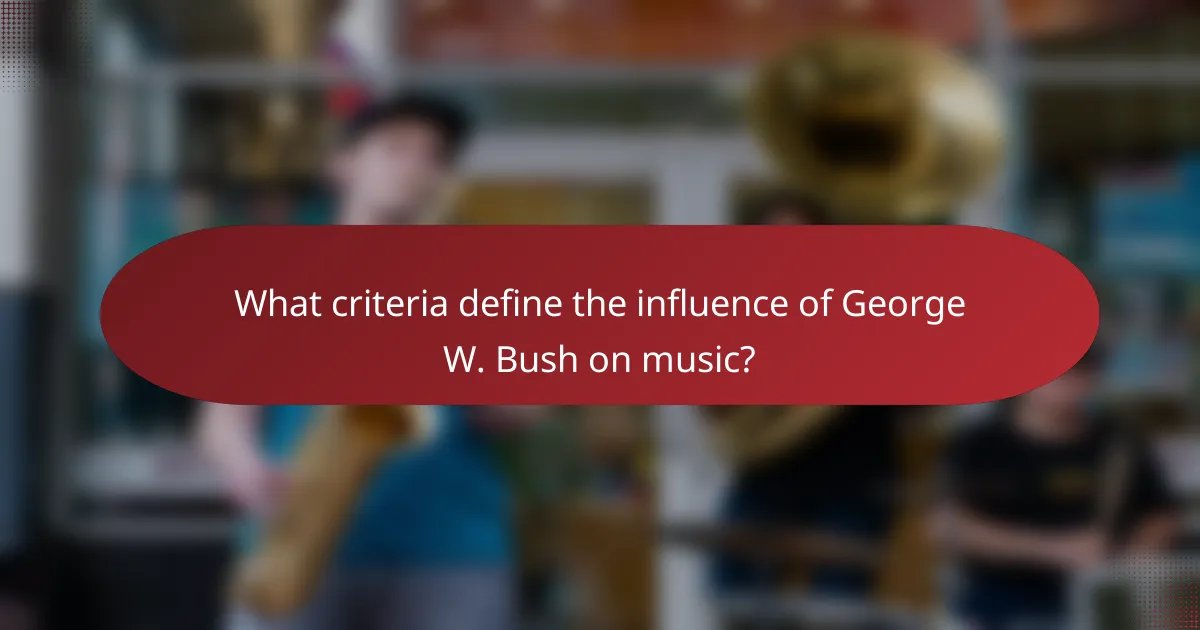
What criteria define the influence of George W. Bush on music?
The influence of George W. Bush on music can be defined by examining the political climate during his presidency, the public’s response to his policies, and how artists used their platforms to express dissent or support. These factors shaped the themes and styles prevalent in contemporary music of that era.
Historical context of his presidency
George W. Bush served as the 43rd President of the United States from 2001 to 2009, a period marked by significant events such as the September 11 attacks and the subsequent wars in Afghanistan and Iraq. These events created a charged atmosphere that artists responded to through their music, often reflecting themes of patriotism, conflict, and social justice.
Musical genres like punk, hip-hop, and folk saw a resurgence of politically charged lyrics, with many artists using their work to critique Bush’s administration. For example, bands like Green Day and artists like Eminem produced songs that directly addressed the political landscape, resonating with a generation grappling with the implications of war and national security.
Public perception of his policies
Public perception of George W. Bush’s policies varied widely, influencing how musicians approached their craft. While some viewed his leadership as strong and decisive, particularly in the wake of 9/11, others criticized his administration for its handling of foreign policy and domestic issues, such as Hurricane Katrina and economic challenges.
This division in public opinion led to a rich tapestry of musical responses, with artists like Bruce Springsteen and Rage Against the Machine voicing opposition through their lyrics. The polarized views on Bush’s presidency fostered a vibrant music scene where artists felt compelled to engage with the political discourse, ultimately shaping the sound and message of the era’s music.
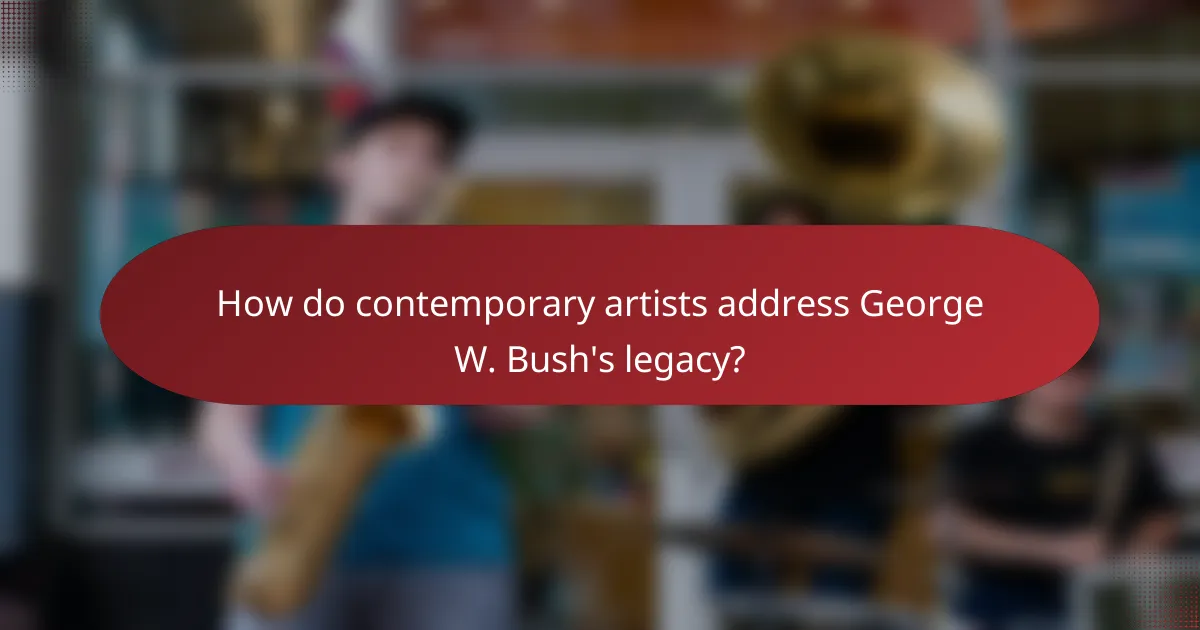
How do contemporary artists address George W. Bush’s legacy?
Contemporary artists often critique and reflect on George W. Bush’s legacy through their music, addressing themes of war, politics, and social issues. This artistic response varies from direct commentary to more abstract interpretations, influencing a wide range of genres and styles.
Documentaries and music
Documentaries featuring music from or about the Bush era often highlight the political climate and social movements of the time. Artists like Green Day and Bruce Springsteen have contributed songs that resonate with the sentiments expressed in these films, providing a soundtrack to the political discourse. These documentaries not only showcase the music but also contextualize its significance within the broader narrative of Bush’s presidency.
For example, the documentary “Fahrenheit 9/11” includes various tracks that critique the administration’s policies, illustrating how music can amplify political messages. Such films serve as a platform for artists to reach audiences who may not engage with political issues otherwise.
Live performances reflecting his era
Live performances during and after Bush’s presidency often serve as a form of protest or reflection on his policies. Artists have used concerts to voice their opposition to the Iraq War and other controversial decisions, creating a space for collective expression. Events like the “Vote for Change” tour in 2004 exemplify how musicians mobilized audiences to engage politically through their performances.
Additionally, many artists incorporate visual elements and spoken word into their shows to enhance their messages. This blending of music with political commentary not only entertains but also educates audiences about the implications of Bush’s legacy, fostering a deeper understanding of contemporary issues.
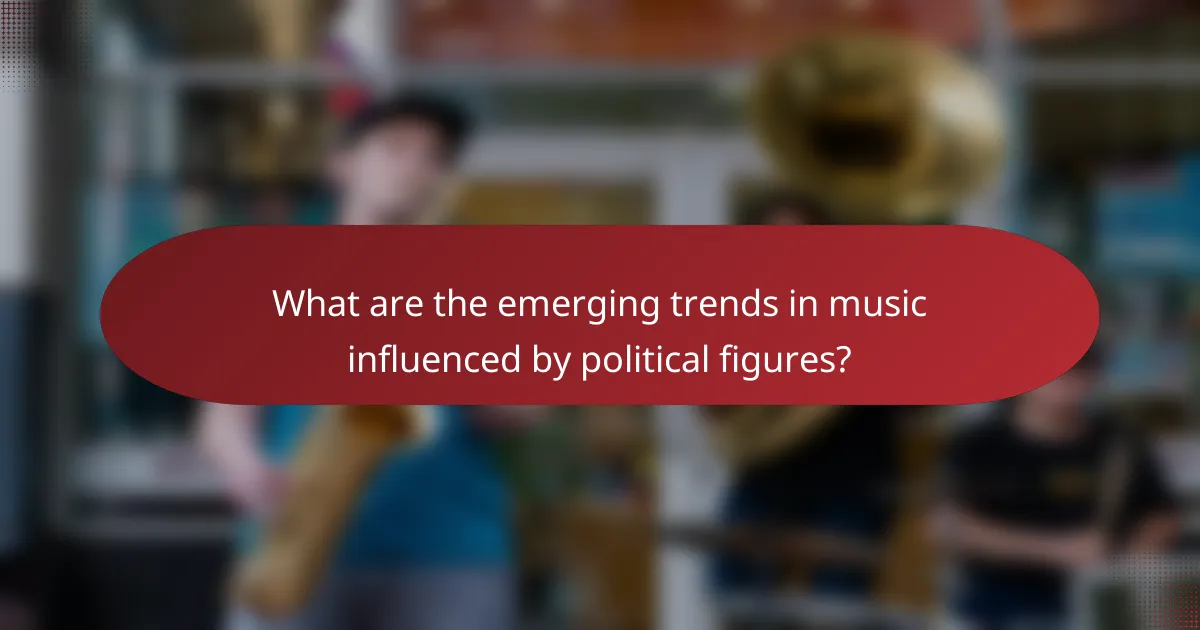
What are the emerging trends in music influenced by political figures?
Emerging trends in music influenced by political figures often reflect societal values and current events. Artists are increasingly using their platforms to address political issues, leading to a rise in politically charged music that resonates with listeners.
Contemporary Artists Shaping Political Music
Many contemporary artists are integrating political themes into their music, using their influence to spark conversations. For instance, musicians like Kendrick Lamar and Billie Eilish have addressed issues such as racial inequality and climate change, respectively. Their work often blends personal narratives with broader societal critiques, making their messages more relatable.
Genres That Embrace Political Themes
Genres like hip-hop, punk, and folk have historically embraced political themes, and this trend continues today. Hip-hop artists often use their lyrics to comment on social justice and systemic issues, while punk music remains a vehicle for anti-establishment sentiments. Folk music, with its storytelling tradition, frequently highlights grassroots movements and personal struggles against political systems.
Impact of Social Media on Political Music
Social media plays a crucial role in the dissemination of politically influenced music. Platforms like Twitter and Instagram allow artists to share their messages quickly and engage with fans directly. This immediate feedback loop can amplify the impact of their music, as listeners are more likely to share and discuss songs that resonate with their political beliefs.
Audience Engagement and Activism
Artists are increasingly encouraging their audiences to engage in activism through their music. Concerts often serve as platforms for raising awareness about political issues, with many artists using their performances to promote voter registration or support social movements. This direct engagement fosters a sense of community among fans who share similar values.



